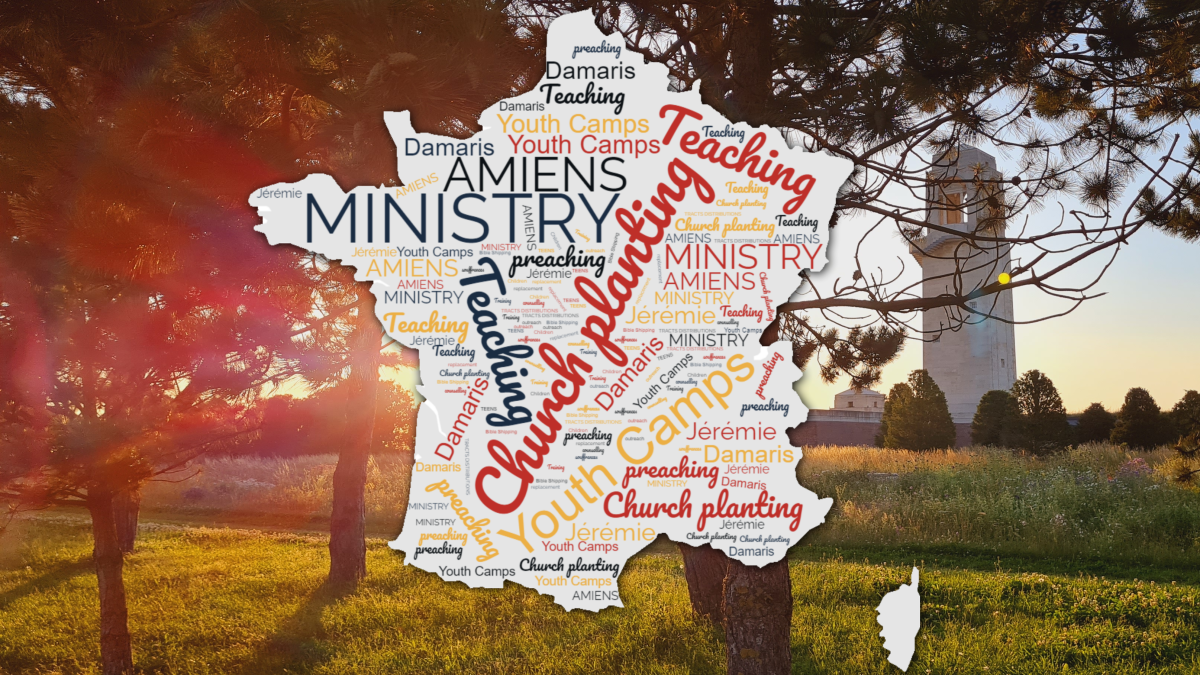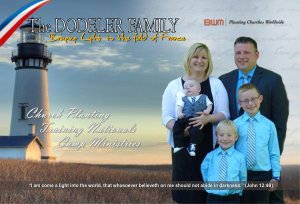- On the Holy Scriptures
- On the One True God
- On Jesus-Christ
- Of man, the fall & the consequences of sin
- Of salvation by Jesus-Christ
Our Beliefs
Doctrinal Statement
This document was first written in 2004 and then translated from french to english in 2005.
On The Holy Scriptures
I believe that the canonic writings of the Old and New Testament are the Word God given to mankind. They constitute the only and infallible rule for faith and practice. They provide the only filter to test all doctrines, all traditions, and all religious or ecclesiastical systems. The Bible constitutes the rule by which to determine methods of Christian action.
I believe that the Holy Scriptures are a providential document, and that the Holy Spirit sovereignly presided to the origin and making of the biblical writings. I believe that God Himself ensured the perfect transmission and recording of the content of the Bible, including the historical truths. By His divine inspiration and under His control the Scriptures are communicating to man the divine oracles, in spite of the imperfection of the human instruments involved in writing the Bible.
I believe that the Holy Scriptures reveal to us all that we need to know about spiritual matters. I believe they should not, in our present dispensation, be modified or completed by any other revelation.
On The One True God
I adore one God in three equal persons: the Father, the Son and the Holy Spirit. The triune God is the creator, sovereign over all things, eternal, infinite, immutable, all-mighty, omniscient, perfectly wise, holy, just and good, to whom is due reverence, obedience, trust, thankfulness, love worship and praises.
I believe He is the creator of heavens and earth and of everything within them. I believe He created matter ex-nihilo (out of nothing), and made all things and beings in six solar days. I thus reject the Big Bang and all other evolutionist theories.
On Jesus-Christ
I believe that Jesus-Christ, is the eternal Word made flesh, the only mediator between God and men, and that from all eternity He is God’s unique Son.
I believe that, conceived by the agency of the Holy Spirit and born of a virgin, He became fully man and remained fully God. After being tempted in all things like us, He stayed perfectly holy.
I believe that, even though He voluntarily humbled Himself, the Son of God manifested on earth the same perfection as before His incarnation. I believe He never failed in His actions nor His teachings.
I believe that Jesus-Christ voluntarily suffered the pain and the agony in my stead, that He died on the cross, taking upon Himself the punishment that awaited sinners, this in order to satisfy the divine justice of God. I believe that on the cross He presented to God His Father the atonement for the whole world through the shedding of His blood. I believe that Jesus-Christ is corporally risen and ascended to Heaven in glory, where He now intercedes for those who belong to Him.
I believe He will first corporally return at the Rapture to take the saints unto Himself. .After a period of intense tribulations on earth, Christ will then come back to establish His glorious millennial kingdom, at the end of which the eternal state will begin. I believe Christ will judge the living and the dead.
Of Man, Of The Fall & Of The Consequences Of Sin
I believe that, man is personally and directly responsible to God, that he is called to determine responsibly and definitively his eternal state. This, he does by the spiritual stand he takes during his lifetime on earth, and with the clarity of the light that was made accessible to him.
I believe that the fall of man was provoked by Satan, and that the rebellion of mankind was precipitated by the wicked insinuations of that fallen angel, Satan had become God’s enemy sometime before the creation of man. He had already drawn in his mutiny some angels who then became instruments of evil. I believe they, as well as Satan, are already doomed to endless torments after the complete victory of Jesus on the cross. The execution of which is impending.
I believe that our first parents, Adam and Eve, were created innocent, but by overtly and consciously disobeying their creator, their primarily state was lost for them and for all their descendants. All came under God’s just judgment because they inherited Adam and Eve’s fallen nature, and are bent to evil through the enslavement to the Prince of this world.
Men’s fallen nature and recurring personal disobedience against God expose all of them to a righteous eternal punishment.
Of The Salvation Through Jesus-Christ
I believe that God, through the blood Jesus-Christ shed on the cross (1 Peter 1:18-19), has provided a complete, perfect and definite way of salvation (John 14:6) to rightfully pardon man of the consequences of his sin (Romans 6:23). This salvation was sovereignly conceived and executed by God because of His loving mercy for mankind (John 3:16). I believe the remission of sin is generously offered to the entire mankind without limitation (1 John 2:2). A sinner cannot save himself. He must place his trust in the generous offer of salvation upon hearing the Gospel (Romans 1:17; Matthew 28:19) and by submitting to the work of conviction of the Holy Spirit (John 16:8).
I believe that the grace of salvation was initiated by divine choice. Before the creation of the world, the Father willed to conceive a plan, whereby repentant sinners would be graciously imputed the righteousness of Christ, would become saints in His eyes and would be adopted as His children. (Ephesians 1:4-6).
The name “elect” is sometime given to those who are born again believers (1 Peter 1:2), but I do not believe in an unconditional election that by-passes man’s free will (Romans 10:9-10). Therefore I do not claim Calvinism as my theological framework. God the Son, through His substitutionary atonement provided the way of salvation for repentant sinners, comprehending full payment for sin, deliverance from the power of sin and an assurance of salvation (Ephesians 1:7-12). God the Holy-Spirit insures the salvation of repenting sinners, first of all by convincing them of the veracity of the Word of God (John 16:1-13) and then by becoming the earnest of their salvation, until they come into their complete and definitive celestial inheritance. (Ephesians 1:12-14).
I believe redemption is impossible without a personal and voluntary decision made by sinners to accept God’s provision for salvation (John 3:16). Sinners have to fully comply with God’s terms for salvation (Ephesians 2:8-9). When sinners repent and put their faith in Christ for their personal salvation they become united with Christ (2 Corinthians 5:17) by the Holy-Spirit (Titus 3:5). This drastic turn about compels believers to move away from sin (Psalms 51:3-4) and put their trust exclusively in the grace of Christ (Romans 10:9-10). Such repentance and faith constitute conversion. At the time of conversion, God justifies sinners through the expiation provided by Christ’s sacrifice. Propitiation having been made by Christ, believing sinners are no longer under condemnation for sin (Romans 8:1). Simultaneously, sinners are regenerated or brought back to spiritual life (John 3:36). They are reconciled with God’s favors (Romans 5:1-2, 10) which will sanctify them.
I sincerely believe the teaching of Scriptures on regeneration. By regeneration, I acknowledge the decisive ministry of the Holy Spirit through which a new nature and a new spiritual life are granted simultaneously to the time of the conversion of sinners.
Born again Christians become new creations in Christ. Without regeneration, salvation is impossible. Without conversion, salvation is impossible (John 3:3-6; 2 Corinthians 5:17; 1 Peter 1:23; Titus 3:5).
I believe in the eternal security of born again believers. From the time of their new birth to the time of ultimate glorification, the salvation of believers is preserved by God.
Hence I reject arminianism as a theological framework. I define my understanding of salvation giving appropriate attention to God’ sovereignty and Man’s responsibility as Biblicism.
This assurance of salvation is based on the following facts:
- The life granted by God is “eternal”
- Believer are kept and protected by the power of God (1 Peter 1:3-5),
- They are sealed with and by the Spirit of God and benefit constantly of Christ interceding ministry in their behalf.(John 5:24; 10:27- 30; Romans 8:1, 29, 30, 38, 39; Ephesians 1:13, 14; 4:30; Hebrews 7:25).
I believe that justification is the legal act by which God declares believers righteous, through their faith in Christ. I believe that justification includes the forgiveness of sins and the imputation of Christ divine justice to the account of repentant believers I believe that justification does not stem of works of justice accomplished by believers, but is divinely granted through faith in the blood of the Redeemer (Isaiah 53:11; Acts 13:39; Romans 5:1-9; 8: 1; 2 Corinthians 5:18-21).
Of The Holy Spirit And Of His Action In Christian Life
I believe that the Holy Spirit is a divine person, that He acts and applies to the heart of men the truths of the Holy Scriptures with which He never disagrees nor ever diagresses. The Holy Spirit produces in believers the Christian life in its principles and effects. He enables them to progress spiritually and persevere until the end. I believe the Holy Spirit is given at the time of regeneration to all those who are born again, and that He seals them as God’s eternal children. It is His ministry also to reveal and communicate the glorious riches of Christ. In order to be truly Christian, any prayer or deed must result of His under girding action. He only can insure the fellowship between believers and God and with other believers.
On Satan
I believe in the personal reality of Satan, that he was the agent of the human fall; that he is only for the present time the prince of this world, and that he shall be judged and doomed to eternal condemnation.
Of Resurrection And Final Judgment
I believe in the corporal resurrection of all the dead, converted as well as unconverted, recognizing however that the Bible establishes a significant time interval between the resurrection of the believers and the resurrection of the unbelievers.
I believe in the objective reality of both heaven and hell. I believe that at the time of death the spirits of unbelievers go directly to “Hades” where they are immediately subjected to punishment for their rebellion, until the final judgment of the White Great Throne and their eternal damnation in the Lake of Fire. (Luke 16:19-31; 1 Peter 2:9). Their bodies will be resurrected for that judgment. Unbelievers will be judged according to their evil deeds and be subjected to proportional, but eternal sufferings. (Mark 9:43-48; 1Thessalonians 4:16-18; Jude 13; Revelation 20:11-15; 21:8).
I believe that through God’s which they received by faith, all the redeemed will rejoice forevermore in glory, that at their death their spirits are brought directly in the presence of their Savior. The believers still alive at the time of the rapture of the church will instantaneously receive glorified bodies. I believe that the spirit of those whose bodies rested in graves will be reunited to resurrected and glorified bodies. (John 3:18; 1 Thessalonians 4:13-18; 1 Corinthians 15; Philippians 1:21-23).
Of The Church
I believe that the Church started at Pentecost, at the time of the special coming of the Holy Spirit promised by Christ (Acts 1:5)
I believe that true believers are individually baptized by the Holy Spirit to constitute one unified spiritual organism, which is compared to a body of which Christ is the head. (1 Corinthians 12:12-13; Colossians 2:19). This macrocosm will have a substantial reality, after the rapture of the Church. The only tangible reality today is the local church as the New Testament teaches.
I believe in accordance to the New Testament, that a church is an assembly of believers, baptized by immersion upon profession of faith, that a true church remains separate from any governmental system and financing, that it is totally independent in spiritual matters from any authority outside of Jesus’ authority. I can see in the earthly local churches, the imperfect and reduced images of the heavenly community, which, at the marriage feast of the Lamb, will be corporately united into the body of the redeemed of the dispensation of Grace.
It’s a body whose head is Christ, which is united for the purposes of worship, Christian service, fellowship, corporate stewardship, discipline, devotion, biblical teaching, local testimony and world-wide evangelism, and the observance around their pastors and deacons of the two Christian institutions, namely baptism and the Lord’s supper.
I believe the church to be an absolute democracy, that it should not be subjected to any other governing system, except its own in accordance with Scriptures. I believe that the local body has the duty, the right and the authority to declare its faith in full agreement with New Testament teachings. I believe that each assembly must recognize that its own democratic government constitutes the high authority to accomplish the will of the Lord Jesus-Christ.
I believe that in the actual dispensation, the local church is the center of the divine redemption program and that all Christian are bound by Scriptures to cooperate without any reservation to the implementation of the God-given missions. I believe that Christians should actively support their local church in prayer and in stewardship according to each’s prosperity, and should joyfully participate to church meetings. I believe that Christians ought to genuinely submit to the kind oversight and discipline of the local church.
I believe that the church must observe two institutions, two ordinances to which no sacramental grace, nor soteriological are attached:
- believer’s baptism
- and the Lord’s Supper.
I believe that total immersion in the name of the triune God is the divinely chosen emblem for regenerated man to testify of the purification of his sin, of his burial and resurrection to a new life with Christ. I believe according to the Lord’s command that this symbolic act is required of all believers and that according to the New Testament practice, it is required for admission within a local church.
I believe that the Lord’s Supper, instituted by Jesus-Christ to commemorate and proclaim His expiatory death on the cross, must be observed by and in local churches until Christ’s return. I believe that the bread and the fruit of the vine are symbols of the unique sacrifice of Christ’s body and of His shed blood on the cross. I believe that through their participation in this remembrance, Christians testify their unity with Christ’s body. I believe that through the commemoration of the Lord’s Supper, believers proclaim their firm assurance of Christ’s return. I believe that only those who are members in good standing of a church of like faith and practice should be allowed to participate to this ordinance.
I believe that today there are only two offices in the local church: pastors and deacons. The Scriptures show no distinctions of rank nor authority between separate biblical words such as ” bishop (overseer), elder (presbyteros), and pastor (shepherd)” (1 Timothy 3:1-13; Acts 6:1-7; 20;17, 28; Ephesians 4:11)
I believe that only one pastor should have the function of overseer, of president of the duly constituted assembly and of shepherd of the flock. The assistant pastors should serve exclusively as auxiliaries to the head pastor in the spiritual realm. Deacons are elected by the local church on the basis of scriptural requirements to take care of the material business of the church. (Acts 6:1-7; Acts 20:17, 28)
I believe that women have vital roles in the life of a local church (1 Timothy 5:14; Titus 2:3-5; Romans 16:1-15). However, none should be given or allowed authority over men, nor allowed to publicly teach them (1 Timothy 2:9-15; 1 Corinthians 14:34-35). No woman can become the pastor of a New Testament local church.
On Separation
I believe that born again Christians are called to a life of separation, separation being both negative and positive, on one hand removing them from sin, doctrinal errors and moral compromises, and on the other hand binding them to the call to holiness of God. Biblical separation appears in at least three realms: moral, personal and ecclesiastical.
Moral:
The divine teaching constitutes the exclusive perfect norm for Christians. They are called to holiness (2 Corinthians 7:1), to show due reverence to God. Believers must avoid sufferings as evildoers, but should joyfully accept sufferings for Christ’s sake (1 Peter 4:15). God calls Christians to maintain a purity of body and spirit (2 Corinthians 10:5).
Personal :
Romans 14 teaches that disagreements may oppose Christians over issues of personal separation. Clearly what is expressly called sin should be shun by all believers. Due attention should be paid by all to the legitimate and implicit applications of biblical principles of separation from evil. In realms undefined by the Scriptures, the greatest harmony should be maintained. Stronger and better taught brethren may do things that weaker and less informed believers consider inappropriate. In the realm of preferences, the highest form of mutual respect should be upheld. As a guiding rule, each man must be fully persuaded in his heart. (Romans 14:5b). The call to love should also help believers to be congenial in matters untaught by the Scriptures. No compromises with explicit teachings should ever be allowed.
Ecclesiastical:
While recognizing the scriptural call to the unity of Christians, I believe that obedient Christians should also acknowledge the fact that biblical separation extends to those who deliberately cultivate ignorance of the Scriptures, promote glaring errors, and do not correct outright disobedience. I disapprove of the National Council of Churches, the World Council of Churches, the mixity observed in the Southern Baptist Convention, the liberalism of the American Baptist Convention, the compromises of the Conservative Baptist Association, the flagrant errors of the Charismatic movement, of the Assemblies of God, of the Willow Creek movement, and of a number of associations, federations, conventions, fellowships that embrace partially or completely their thesis. I reject the ecumenical movement, neo-orthodoxy, neo-evangelicalism, the charismatic movement, and any ecumenical endeavors between churches and individuals who are not fully attached to the faith which was once delivered unto the saints. (Jude 3; 2 Corinthians 6:14-18; Ephesians 5:11, 12; Luke 12:51)
I believe that the contemporary movement based on healings and speaking in tongues is not scriptural, that it is contrary to the doctrines of the Bible, and that those who practice such things are in error. (1 Corinthians 14:33, 40; 13:8-11; 12:10).





